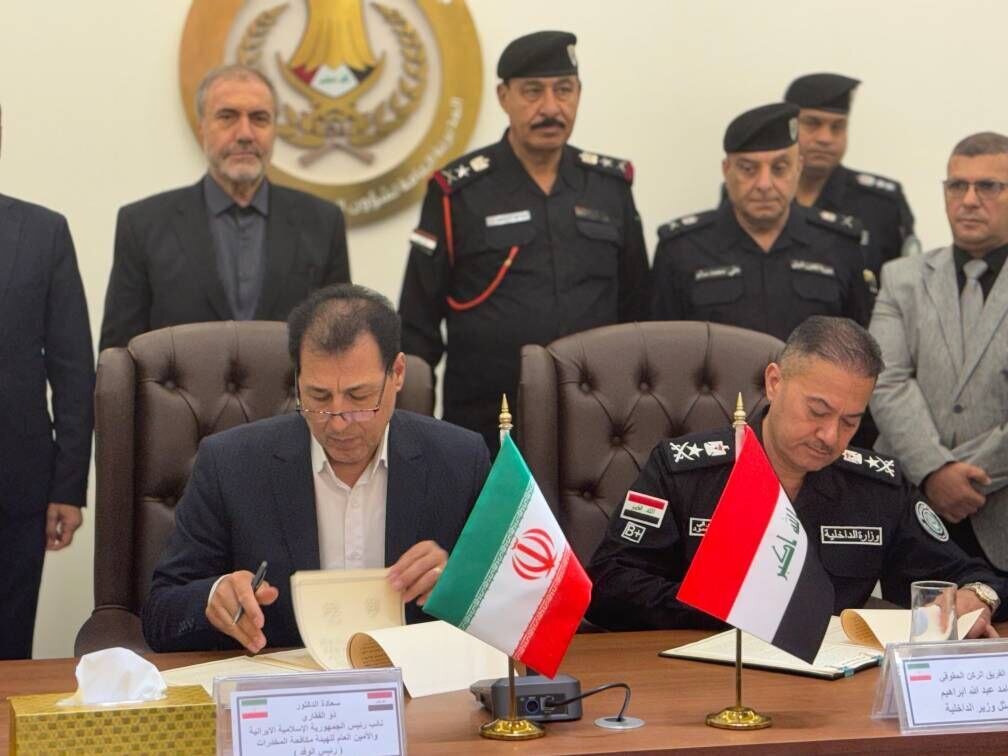Iran, Iraq sign MOU to beef up ties in combating narcotics

TEHRAN – Iranian and Iraqi officials have signed a memorandum of understanding to foster collaborative efforts in the fight against illicit drugs.
The MOU was signed on Thursday during the 2nd joint meeting of committee on combating drugs and psychotropic substances held in Baghdad.
Brigadier General Hossein Zolfaqari, the secretary general of the Drug Control Headquarters (DCHQ), participated in the second meeting at the invitation of Iraqi Health Minister Saleh al-Hasnawi, who is also the head of the Supreme Committee for Combating Drugs in Iraq.
The MOU focuses on measures to boost training, empowerment, security, and technical skills.
Strengthening border security, empowering law enforcement forces through holding mutual training workshops, developing the scientific capacities of experts in demand reduction, prevention, treatment, and empowerment, exchanging joint activities, increasing monitoring of psychotropic substances and chemical precursors under international supervision to prevent their use in the illicit manufacture of drugs, are among the main goals of the agreement.
On Wednesday, Zolfaqari and Iraqi Interior Minister Abdul Amir al-Shammari met, highlighting the two countries’ commitment to combat narcotics as one of the biggest social and security challenges of the modern era.
This ominous phenomenon has targeted national security and the health of society, particularly youth, as well as the economic stability of the two nations. Our shared geography should be a source of prosperity and progress,” IRNA quoted Zolfaqari as saying.
Elaborating on the initial achievements in the fight against drugs, he said, “sharing information and expertise on narcotics has paved the way for taking effective measures. However, our common enemy is sophisticated, armed, and equipped with the latest means of technology. Therefore, these initial successes should not deter us from our commitment to address broader dimensions of the threat.”
The official went on to propose the establishment of a joint border security operation center with liaison officers from the two countries to enable the exchange of information in real-time and coordinate joint missions with greater accuracy.
He also voiced Iran’s readiness to hold specialized training courses on the latest strategies to detect and combat organized smuggling and money laundering for both Iranian and Iraqi anti-narcotics police.
The development of a legal subcommittee was another proposal made by Iran. It aims to identify and freeze assets of smuggling networks operating in the two countries, as well as facilitate and expedite coordination in the field of judicial laws and protocols.
The collaborative efforts in the war against drugs should not be limited to land borders. Coordination in monitoring drug trafficking at air borders, cyberspace, and social networks will significantly impact smugglers.
During the official visit to Iraq, Zolfaqari also held a meeting with Iraq’s Health Minister al-Hasnawi.
Following the meeting, al-Hasnawi said, “There is serious cooperation between the Iraqi and Iranian security and health authorities in combating drugs.
This cooperation has advanced to reduce drug smuggling crimes across the two countries,” rudaw.net reported.
These meetings are the fruit of the memorandum of understanding signed between the Supreme Committee for Narcotics and Psychotropic Substances in Iraq and the Islamic Republic of Iran two years ago, the official added.
The Iraqi government official delved into further details that “the meeting’s recommendations were effective, realistic, and applicable,” expressing his hope for “further consolidation of relations between the two countries, as well as between Iraq and neighboring countries, to curb the phenomenon that has invaded society.”
On the last day of the trip, Zolfaqari attended a press interview. “The second joint meeting highlights adopting a unified approach in the fight against illicit drugs. The main objective of this initiative is to strengthen the security of joint borders, exchange information and conduct collaborative missions, reduce drug-related crimes, as well as share successful experiences in lowering demands,” he noted.
The official underlined that Iran and Iraq are committed to creating a safer place for their citizens through addressing challenges posed by drug trafficking more effectively. It will enhance the stability in the region, as well.
MT/MG
Leave a Comment